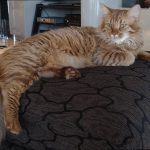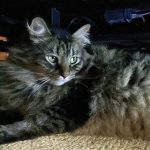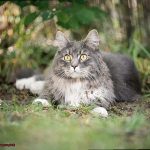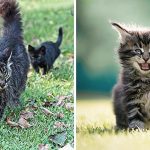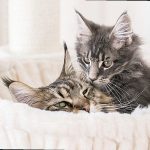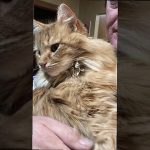Prepare to enter the intriguing world of Maine Coons, where majestic beauty meets untamed aggression. These regal felines are known for their gentle nature and unwavering loyalty to their human companions. However, not all Maine Coons are created equal, as some possess a ferocious streak that ignites when faced with other cats. If you’re grappling with this puzzling issue, fear not. By delving into the depths of your Maine Coon’s psyche, we can uncover the reasons behind this aggressive behavior and pave the way for a more harmonious feline kingdom.
Maine Coons, like any other feline royalty, have their reasons for brandishing their claws. From territorial instincts to lack of socialization or even haunting memories of past negative encounters, these factors can fuel the fire within your beloved Maine Coon. To truly grasp why your kitty king or queen is launching an assault on their fellow feline subjects, we must embark on a journey through these causative factors. Armed with this knowledge, you’ll be equipped to create an environment that ensures safety for all cats involved and fosters a purrfectly peaceful coexistence within your regal cat domain.
In the following paragraphs, we will dive headfirst into these causes, shedding light on the triggers that awaken aggression in Maine Coons. Brace yourself for valuable insights on proactive measures that can be taken to tame this wild behavior. Remember, understanding is our key to unlocking a solution that benefits both your cherished Maine Coon and the entire royal cat court.
So gather your curiosity and join us as we unravel the enigma of your Maine Coon’s aggression towards other cats. Together, we’ll navigate through uncharted territories and emerge victorious in creating a realm where peace reigns supreme among all furry inhabitants.
Why is my Maine Coon so aggressive to other cats
Maine Coons are gentle giants, known for their majestic appearance and loving nature. However, if you’re experiencing aggression from your Maine Coon towards other cats, it can be concerning and confusing. In this article, we will explore the possible reasons behind your Maine Coon’s aggressive behavior and provide insights on how to address it.
Breed Predisposition:
Maine Coons have a strong and dominant personality, which can contribute to their aggression towards other cats. Their natural hunting instincts and territorial nature make them more prone to assertiveness and dominance. While not all Maine Coons exhibit aggressive behavior, it is more common in this breed compared to others.
Lack of Socialization:
Proper socialization during a Maine Coon’s early development stages is crucial in preventing aggression towards other cats. If your Maine Coon hasn’t been exposed to other cats or has had negative experiences with them, they may become apprehensive or defensive, leading to aggression when encountering other feline companions.
Resource Guarding:
Maine Coons can be possessive about their territory, food, toys, or even their humans. This resource guarding behavior can trigger aggression when another cat approaches or tries to access their belongings. Providing each cat with their own resources can help minimize conflicts and reduce the likelihood of aggressive behavior.
Unwanted Interactions:
Just like humans, cats have unique personalities and preferences when it comes to socializing. Some Maine Coons may simply prefer a solitary lifestyle and feel stressed or threatened when forced to interact with other cats. Respecting your cat’s individual preferences can help prevent aggression and create a peaceful environment for all cats involved.
Medical Issues:
Aggression in Maine Coons can also stem from underlying medical conditions. Pain, discomfort, hormonal imbalances, or neurological issues can manifest as aggressive behavior towards other cats. Consulting with a veterinarian to rule out any potential medical causes is crucial before assuming the aggression is solely behavioral.
Stress and Anxiety:
Maine Coons, like any other animal, can experience stress and anxiety, which may amplify their aggressive tendencies towards other cats. Changes in the household, such as moving or introducing new pets or family members, can trigger stress in cats. Providing a calm and stable environment, along with appropriate stress-relieving techniques, can help alleviate aggression caused by anxiety.
Lack of Proper Introduction:
Introducing new cats without proper planning and gradual introduction can lead to aggression. Maine Coons may feel threatened or territorial when a new cat is introduced into their established territory. Following a structured introduction process, allowing the cats to become familiar with each other’s scents and gradually increasing their interactions under supervision, is essential.
Understanding the Aggression of Maine Coons to Other Cats
In this article, we’ll dive deep into the factors that contribute to this behavior and give you the tools to create a harmonious multi-cat household.
Territoriality: Defending Their Kingdom
Maine Coons have an innate need to protect their territory and establish dominance. When another cat encroaches upon their space or resources, aggression may ensue. Ensure each cat has their own food, water, and litter box to minimize competition and reduce aggression.
Socialization: Early Lessons Matter
Like any breed, Maine Coons require proper socialization during early development stages. If not exposed to other cats or have experienced negative interactions in the past, they may resort to aggression as a defense mechanism or a way of asserting dominance. Gradual introductions and positive experiences can make all the difference.
Hormonal Factors: Unleashing the Beast
Intact male Maine Coons can display heightened aggression due to their instinctual drive to compete for mates. Neutering or spaying your Maine Coon can help reduce hormone-driven aggression and promote more peaceful interactions.
Mutual Interactions: It Takes Two to Tango
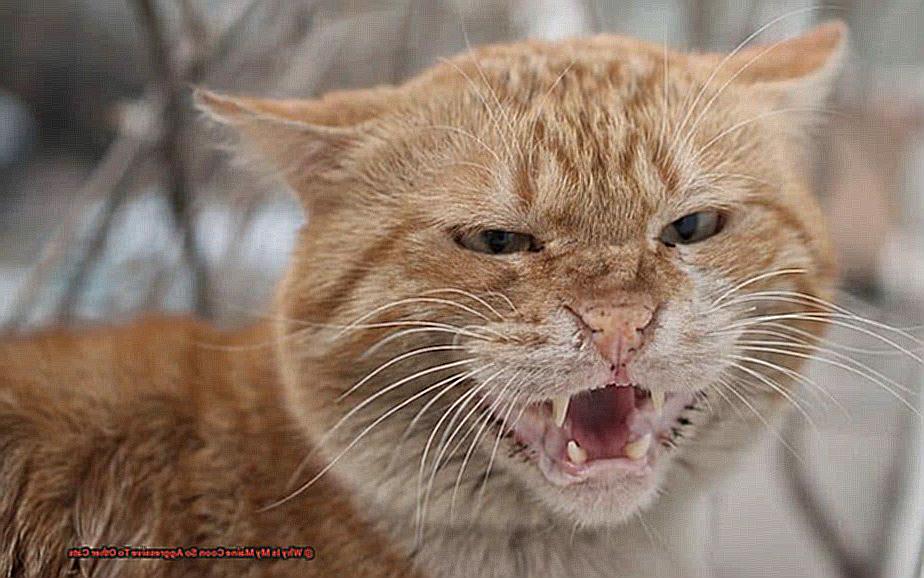
Remember, not all instances of aggression are solely the Maine Coon’s fault. Other cats involved may also contribute through their behavior or body language. Observe and understand the dynamics between your cats to identify triggers or patterns that lead to aggression.
Genetics and Aggression in Maine Coons
Understanding the genetic factors that contribute to aggression in Maine Coons can help us better manage and address this behavior. While genetics alone do not determine a cat’s behavior, certain genetic factors may predispose Maine Coons to be more prone to aggression towards other cats. Let’s dive into the world of feline genetics and uncover how it relates to aggression in our beloved Maine Coons.
Territoriality and Dominance Genes
Maine Coons are known for their strong sense of territory and dominance. Certain genes related to these traits can influence a cat’s behavior and make them more likely to display aggressive tendencies towards other cats. These genes are not unique to Maine Coons, but their presence may be more prevalent in this breed.
Temperament Traits
Each cat has its own unique personality, influenced by genetics. Some Maine Coons may inherit temperament traits that make them naturally more dominant or assertive. This can increase the likelihood of aggressive behavior towards other cats. However, it’s important to remember that genetics is not the sole determining factor, as environmental factors also play a significant role.
Managing Aggression in Maine Coons
If you have a Maine Coon displaying aggressive behavior towards other cats, there are several strategies you can try:
Consult with a veterinarian or professional animal behaviorist: They can assess the situation and provide guidance tailored to your specific Maine Coon.
- Behavior modification techniques: Positive reinforcement training can be effective in reducing aggression. Gradual introductions to other cats can also help your Maine Coon feel more comfortable and less threatened.
- Provide a safe and enriching environment: Ensuring your Maine Coon has plenty of mental and physical stimulation can help alleviate stressors that may contribute to aggression.
Early Socialization for Maine Coons
Today, we’ll delve into the fascinating world of Maine Coons and discuss the importance of early socialization in curbing their aggressive tendencies towards other cats. By laying down the groundwork during their critical developmental period, you can transform your Maine Coon from a potential lion into a loving companion who plays well with others.
Making Friends Furr-ever – Introducing your Maine Coon to Other Cats
- Slow and steady wins the race: Gradual introductions between your Maine Coon kitten and well-behaved adult cats can work wonders.
- The power of observation: Supervised interactions allow your kitten to learn vital social cues and appropriate behavior from experienced feline mentors.
From Frenemies to Furriends – Positive Experiences with Other Animals
- Canine camaraderie: Friendly interactions with dogs can teach your Maine Coon that they’re not just barking up the wrong tree.
- Small but significant: Calm small animals like rabbits or guinea pigs can help foster a more accepting attitude towards different species.
Humans, the Cat Whisperers – Positive Associations with People
- Gentle handling and regular cuddles: Regular human interaction helps your Maine Coon feel comfortable and sociable around humans.
- Variety is the spice of life: Exposing your kitten to humans of different ages, genders, and appearances ensures they become truly social butterflies.
From Couch Potato to Adventurer – Exposure to Different Environments
- Room to roam: Letting your kitten explore different rooms in your house fosters adaptability and confidence.
- Outdoor escapades: Once fully vaccinated, supervised outdoor adventures can enrich their experiences and further reduce aggression towards other cats.
You are now armed with the knowledge and strategies to tame the lion within your Maine Coon through early socialization. Remember, this process is ongoing and requires consistent exposure to various social situations and positive reinforcement. By investing time and effort in their early development, you can ensure a harmonious coexistence between your majestic Maine Coon and other feline companions.
Territorial Instincts of Maine Coons
Maine Coons, known for their majestic appearance and affectionate nature, possess strong territorial instincts that can sometimes manifest as aggression towards other cats. In this section, we will explore the factors contributing to this behavior and discuss strategies to manage it effectively.
The Origin of Territorial Instincts:
Maine Coons’ territorial instincts trace back to their history as working cats on farms and ships. They were prized for their ability to keep rodents at bay, necessitating a natural inclination to establish and defend their territory.
Protecting Resources:
Aggression towards other cats often arises from the instinctual need to protect essential resources like food, water, and shelter. Maine Coons consider these resources as their own and may react aggressively when they feel their possessions are threatened.
Establishing Dominance:
Territorial aggression in Maine Coons can also be a means of asserting dominance and establishing their place in the social hierarchy. This behavior is more common in male Maine Coons but can also occur in females.
Individual Variations:
It is crucial to recognize that not all Maine Coons will exhibit aggressive behavior towards other cats. Like humans, they have unique personalities, and some may be more prone to territorial aggression than others.
Minimizing Territorial Aggression:
Early socialization and proper introductions play a vital role in curbing territorial aggression in Maine Coons. Gradual exposure to other cats during kittenhood helps them learn appropriate social behavior and reduces the likelihood of aggressive tendencies.
Resource Management:
Providing each cat with their own resources, including separate food bowls, water dishes, and litter boxes, can prevent conflicts over territory by ensuring that each cat has access to essential resources without competition.
Neutering/Spaying:
Neutering or spaying your Maine Coon can significantly decrease territorial aggression. These procedures reduce hormone-driven behaviors that contribute to aggression and help create a more harmonious environment.
Seeking Professional Help:
If territorial aggression persists despite your efforts, consulting with a veterinarian or professional animal behaviorist can provide valuable insights and guidance in managing the behavior effectively.
Past Experiences with Other Cats and Aggression in Maine Coons
Maine Coons, those gentle giants of the feline world, are usually known for their friendly and sociable nature. However, there are instances when these majestic cats display aggression towards other cats. In this article, we will explore the factors that contribute to such behavior, including early socialization, territorial instincts, hierarchy establishment, personality traits, and past negative experiences. By understanding these elements, we can better address aggression issues and foster peaceful coexistence among our furry companions.
Early Socialization: The Key to Positive Interactions
Early socialization plays a critical role in shaping a Maine Coon’s behavior towards other cats. Kittens that have positive experiences with other feline companions during their formative weeks tend to be more accepting and tolerant later in life. Conversely, limited exposure or negative encounters may lead to aggressive tendencies when encountering unfamiliar cats.
Territorial Behavior: Defending Their Kingdom
Maine Coons can be territorial creatures, fiercely protective of their domain. When introducing a new cat into the household or encountering unfamiliar felines in their territory, aggression may arise as a means to establish dominance and safeguard their space. Hissing, growling, and even physical attacks are common displays of territorial behavior.
Hierarchy Establishment: The Battle for Supremacy
Like all cats, Maine Coons have a natural instinct to establish hierarchies within their social groups. When introducing a new cat to the household, aggression can manifest as they vie for dominance. This behavior is particularly evident in multi-cat households where each cat strives to assert their position within the hierarchy.
Personality Traits: Uniqueness That Shapes Behavior
Just like humans, each Maine Coon has its own distinct personality traits that influence their interactions with other cats. Some may naturally exhibit dominant or territorial tendencies, predisposing them to aggression. Recognizing these individual differences is crucial when addressing aggression issues in Maine Coons.
Past Negative Experiences: The Ghosts of Trauma
Maine Coons that have endured traumatic or negative encounters with other cats may develop aggression as a defense mechanism. Previous attacks or bullying can trigger a fear-based response, leading to aggression towards other cats. Identifying and addressing any underlying trauma is essential for promoting positive interactions.
Hormonal Factors and Aggression in Maine Coons
- Testosterone: Male Maine Coons have higher levels of testosterone, which can contribute to their dominant and territorial behavior. This hormone is responsible for the development of secondary sexual characteristics and is linked to aggression in cats.
- Neutering or Spaying: To reduce aggression in Maine Coon cats, it is highly recommended to have them neutered or spayed. This procedure helps to decrease the production of testosterone, leading to a calmer and less aggressive demeanor.
- Female Hormonal Changes: Female Maine Coons may display aggression during their heat cycles due to hormonal fluctuations. They can become more territorial and aggressive towards other cats during this period.
Managing Aggression:
- Consult a Professional: It’s crucial to seek advice from a veterinarian or feline behaviorist who can assess your Maine Coon’s specific situation and offer tailored solutions for managing aggression.
- Neutering or Spaying Females: Spaying female Maine Coons can help prevent heat cycles altogether, reducing aggression caused by hormonal changes. Additionally, hormone-suppressing medications may be prescribed by your veterinarian to manage aggression effectively.
- Socialization and Environment: While hormonal factors play a significant role, socialization and a positive environment are equally important in shaping a Maine Coon’s behavior. Introducing them to other cats gradually, providing mental stimulation, and creating a peaceful space can help minimize aggression.
Understanding the impact of hormonal factors on aggression in Maine Coon cats is essential for cat owners. By addressing these factors through neutering or spaying, seeking professional guidance, and creating a nurturing environment, we can help our Maine Coons thrive in harmony with other cats. Remember, each cat is unique, so be patient and persistent in finding the best approach for your furry companion.
Medical Conditions that May Cause or Contribute to Aggression in Maine Coons
Maine Coons, like any other cat breed, can exhibit aggressive behavior towards other cats. However, it is important to understand that aggression in cats can have various underlying causes, including medical conditions. Identifying and addressing these medical conditions is crucial in managing and reducing aggression in Maine Coons.
Hyperthyroidism:
One medical condition that may contribute to aggression in Maine Coons is hyperthyroidism. This condition occurs when the thyroid gland produces an excessive amount of thyroid hormone. Hyperthyroidism can lead to increased irritability and aggression in cats. Other symptoms of hyperthyroidism may include weight loss, increased appetite, excessive thirst, and restlessness. If a Maine Coon is exhibiting aggressive behavior towards other cats along with these symptoms, it is recommended to have them evaluated by a veterinarian for possible hyperthyroidism.
Pain or Discomfort:
Another medical condition that can cause or contribute to aggression in Maine Coons is pain or discomfort. Cats are known for hiding their pain, making it challenging to identify when they are experiencing discomfort. However, if a Maine Coon is aggressive towards other cats and displaying signs such as reluctance to be touched, changes in grooming habits, or altered posture, it could be an indication of an underlying medical issue causing pain. Common sources of pain in cats include dental problems, arthritis, urinary tract infections, or gastrointestinal issues. A thorough examination by a veterinarian can help identify and address any potential sources of pain.
Feline Interstitial Cystitis (FIC):
Feline interstitial cystitis (FIC) is another medical condition that can lead to aggression in Maine Coons. FIC is a complex disorder characterized by inflammation of the bladder and urinary tract. Cats with FIC may experience recurrent episodes of painful urination, frequent trips to the litter box, and blood in the urine. The discomfort associated with FIC can make cats more irritable and prone to aggressive behavior towards other cats. Treatment options for FIC typically include pain management, stress reduction techniques, and dietary modifications.
Reproductive Issues:
Hormonal imbalances caused by reproductive issues can also contribute to aggression in Maine Coons. Unneutered or unspayed cats may display territorial aggression towards other cats, especially if they perceive them as a threat to their territory or potential mates. In such cases, having the Maine Coon neutered or spayed can help reduce aggressive behavior.
Comprehensive Approach:
It is important to note that while medical conditions can contribute to aggression in Maine Coons, behavioral factors and environmental stressors also play a significant role. Therefore, a comprehensive approach that includes addressing any underlying medical issues, providing appropriate behavioral interventions, and creating a calm and enriched environment is essential in managing aggression in Maine Coons.
Managing Aggression in Maine Coons towards Other Cats
Maine Coons, with their majestic size and strong personalities, can sometimes exhibit aggressive behavior towards other cats. As a responsible owner, it is crucial to understand the reasons behind this aggression and learn effective management techniques. In this blog post, we will dive into the world of Maine Coon aggression and explore strategies to create a peaceful multi-cat household.
Understanding the Reasons Behind Aggression:
Territoriality: Maine Coons are naturally territorial animals, and introducing a new cat or changes in the existing hierarchy can trigger aggression. To manage territorial aggression:
- Provide separate resources for each cat (litter boxes, feeding areas, resting spots).
- Gradually introduce new cats, allowing them to get used to each other’s scent before direct interactions.
Fear or Anxiety: Some Maine Coons may feel threatened by the presence of other cats and resort to aggression for self-protection. To manage fear-based aggression:
- Create a safe environment with hiding spots and vertical spaces.
- Encourage play and exercise to boost confidence.
- Use positive reinforcement training techniques to reduce fear response.
- Hormonal Factors: Intact males may display aggression towards other males as a way to establish dominance and compete for mates. Neutering or spaying can help reduce this aggression.
- Medical Issues: Underlying medical conditions like hyperthyroidism, pain, dental problems, or feline interstitial cystitis (FIC) can contribute to aggression. It is essential to consult a veterinarian for proper diagnosis and treatment.
Managing Aggression Successfully:
- Consistency: Consistency is key when implementing management strategies. Stick to established routines and boundaries to reduce stress and promote harmony.
- Positive Reinforcement: Reward desired behaviors with treats, praise, or playtime. This approach encourages positive associations and helps redirect aggressive tendencies.
- Environmental Enrichment: Provide ample opportunities for mental and physical stimulation, such as interactive toys, scratching posts, and perches. A stimulated Maine Coon is a happier and less aggressive cat.
- Seek Professional Help: If aggression persists or escalates despite your best efforts, consult with a professional behaviorist who specializes in cat behavior. They can provide tailored advice and guidance based on your specific situation.
Also Read: Can Cats Have Lemon Juice
Conclusion
Maine Coons are known for their gentle and friendly nature, but sometimes they can display aggression towards other cats. This behavior can be influenced by various factors, such as territorial instincts, fear, or past experiences. It’s essential to understand the underlying reasons behind your Maine Coon’s aggression to address the issue effectively.
Territorial instincts play a significant role in a cat’s behavior. Maine Coons, being large and dominant cats, may feel the need to assert their territory and establish dominance over other feline companions. This can lead to aggressive behaviors like hissing, growling, and even physical confrontations.
Fear is another factor that can contribute to aggression in Maine Coons. If your cat feels threatened or insecure in its environment, it may react aggressively towards other cats as a defensive mechanism. Identifying the triggers of fear and providing a safe and secure space for your Maine Coon can help alleviate this aggression.
Past experiences also shape a cat’s behavior. If your Maine Coon has had negative encounters or traumatic experiences with other cats in the past, it may develop an aggressive response as a means of self-preservation. Understanding these past experiences and working on building positive associations with other cats through gradual introductions and supervised interactions can help reduce aggression.
In conclusion, while Maine Coons are generally friendly and sociable cats, they can exhibit aggression towards other feline companions due to territorial instincts, fear, or past experiences. By understanding these underlying reasons and implementing appropriate strategies such as providing a secure environment and positive introductions, you can help mitigate your Maine Coon’s aggressive behavior towards other cats.
